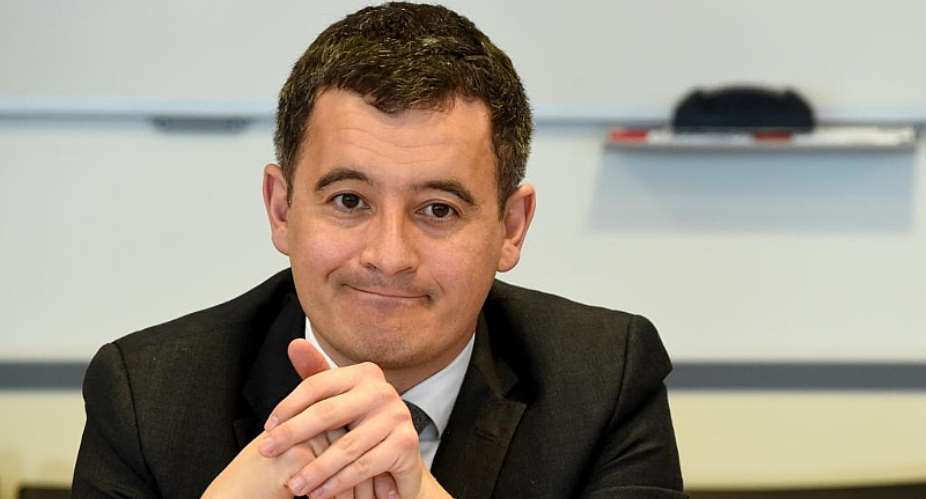Beware of politicians bearing gifts. Seven-and-a-half months before Christmas, the French budget minister is promising money for nothing. Where's the catch?
The same headline appears, in almost identical form, in at least four of today's Paris daily papers: “Darmanin says 95 percent will pay less income tax,” is business paper Les Echos' summary.
Ditto at Le Figaro, Le Monde and La Croix, allowing for poetic and editorial variations.
It's the news equivalent of “Pigs will fly.” In other words, not too many people really believe that their personal tax bill will actually decrease.
The Dramanin is question is Gérald, the French budget minister. And he is smiling like a Cheshire cat this morning because he reckons that the average tax-paying household will be doing less of that next year, to the tune of about 300 euros.
Just to prove that this is not some figure pulled out of the air-conditioned atmosphere in Darmanin's riverside headquarters in Paris, the minister is quick to make clear that we're talking “orders of magnitude” here, not hard cash. He will endeavour to ensure that the middle classes get the most benefit, with the stinky rich getting least.
If there isn't a wise saying to the effect that you should never trust a budget minister who uses expressions like “orders of magnitude,” there certainly should be.
Especially when the diminutive Darmanin admits to earning 8,000 euros per month himself, adding that such a salary will automatically exclude him from any right to benefit from the new measures. At least that's clear.
The changes will come into effect next January, and will be based on a recalculation of each individual's tax rate. The individual concerned will not have to do anything beyond decide how to spend her or his 300-euro bonus. And, of course, keep an eye out for those flying pigs!
And, before you wake up...
Which brings me, or perhaps, brings me back, to the subject of dreams.
Today's Le Monde looks at a report from the current issue of the Journal of Neuroscience, in which an international research team report on something called frontal alpha asymmetry.
Not to be confused with orders of magnitude.
The right side of the frontal lobe of the human brain, explains Le Monde, is the bit which helps us to control our emotions. When you get angry, that particular zone stops sending out alpha waves. Hence the asymmetry, since the left frontal lobe regards the neighbouring rage with an imperturbable calm characterised by a regular emission of those gentle alpha waves.
And so, to sleep.
Because it turns out that, even in our dreams, exactly the same cerebral mechanisms are at work. Forty-one percent of experimental subjects in a sleep laboratory, woken after five minutes of dreaming, report that they were having an angry dream, and simultaneous brain scans showed that their right frontal lobes were completely void of alpha waves.
And what if we reversed the current, Doctor?
The scientists are now wondering if they couldn't turn the procedure around, inundating the raging region of the waking brain with alpha waves, thus turning us all into smiling lambs.
The same researchers are also trying to figure out to what extent these angry dreams are the brain's way of making sure we don't beat up our colleagues in the waking world. The brain may either be preparing for a possible real-world conflict, allowing us to pre-record a more sophisticated response than a punch in the nose; or it may simply be creating a play-space in which we can let our emotions loose without harm.
When waking subjects are asked to look at horrible images, the same brain areas are stimulated as when those same subjects dream of seeing atrocious acts being carried out. But those who have previously had horrible dreams are less dramatically affected by the images than those who have never had such dreams. Support, perhaps, for the brain-preparing-through-dream theory?
It seems clear, at the current stage of medical understanding, that negative experiences while we sleep may turn out to be very useful.
For example, medical students who dreamed that they had failed their final exams invariably did better than their colleagues who dreamt of something unrelated.
So, look on the bright side. The next time you wake having made an imaginary mess of that crucial interview, your brain is probably preparing you for a brilliant performance.
Unless, of course, it's really helping you get ready for the crushing disappointment of failure.
Sweet dreams.





 Lay KPMG audit report on SML-GRA contract before Parliament – Isaac Adongo tells...
Lay KPMG audit report on SML-GRA contract before Parliament – Isaac Adongo tells...
 Supervisor remanded for stabbing businessman with broken bottle and screwdriver
Supervisor remanded for stabbing businessman with broken bottle and screwdriver
 NDC watching EC and NPP closely on Returning Officer recruitment — Omane Boamah
NDC watching EC and NPP closely on Returning Officer recruitment — Omane Boamah
 Your decision to contest for president again is pathetic – Annoh-Dompreh blasts ...
Your decision to contest for president again is pathetic – Annoh-Dompreh blasts ...
 Election 2024: Security agencies ready to keep peace and secure the country — IG...
Election 2024: Security agencies ready to keep peace and secure the country — IG...
 People no longer place value in public basic schools; new uniforms, painting wil...
People no longer place value in public basic schools; new uniforms, painting wil...
 'Comedian' Paul Adom Otchere needs help – Sulemana Braimah
'Comedian' Paul Adom Otchere needs help – Sulemana Braimah
 Ejisu by-election: Only 33% of voters can be swayed by inducement — Global InfoA...
Ejisu by-election: Only 33% of voters can be swayed by inducement — Global InfoA...
 Minority will expose the beneficial owners of SML, recover funds paid to company...
Minority will expose the beneficial owners of SML, recover funds paid to company...
 Prof. Opoku-Agyemang has ‘decapitated’ the NPP’s strategies; don’t take them ser...
Prof. Opoku-Agyemang has ‘decapitated’ the NPP’s strategies; don’t take them ser...
